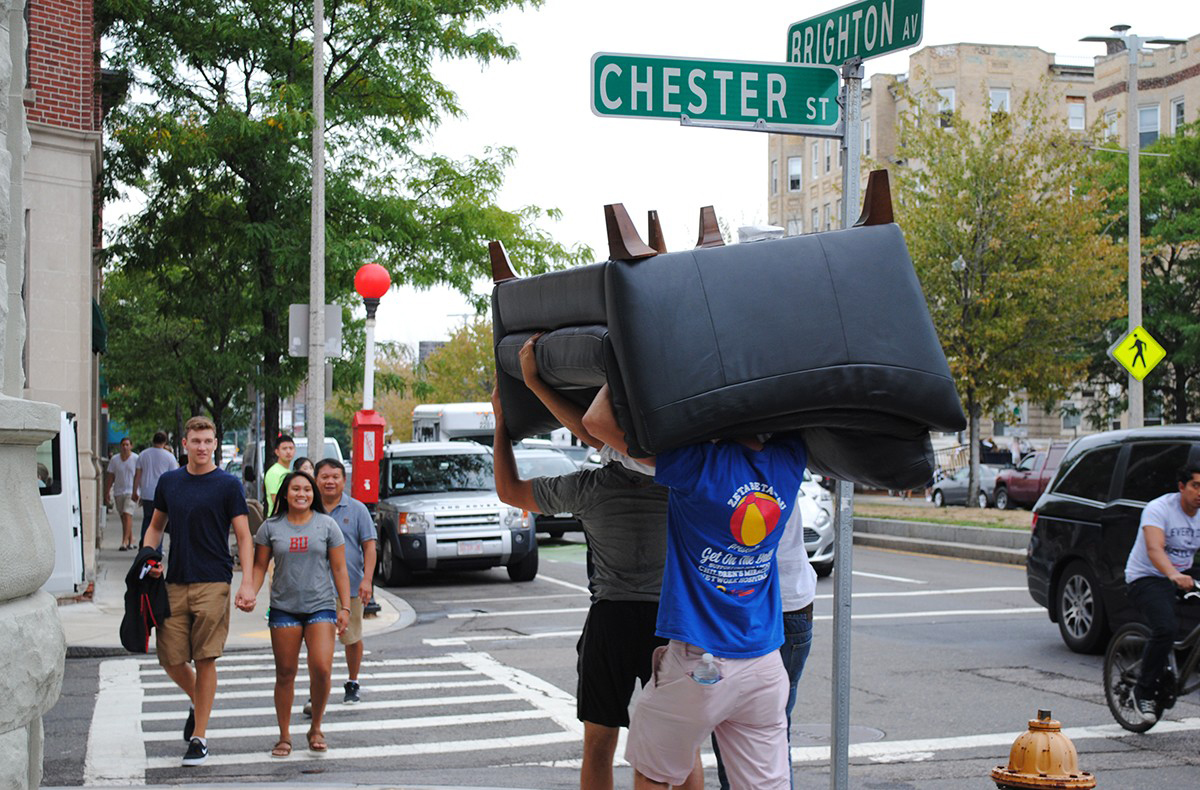How to Stay Out of the ER This September 1

Photo by Madeline Bilis
Ah, September 1. ‘Tis the season of sold-out U-Haul rental centers, weirdly stained mattresses littering every street corner, and near-misses (and direct hits) on Storrow Drive. The most wonderful time of the year, it is not.
Nothing we can say will ease the emotional pain of September 1 in Boston—but to protect you from physical pain, we collected some moving safety tips from Dr. Robin Mayfield, a physician at CareWell Urgent Care in Somerville. Merry Allston Christmas!
1. Pack smart. Consolidating boxes is just efficient moving, right? Wrong. “Packing things in smaller boxes, and not packing too many things in smaller boxes, would be the best way to go,” Mayfield says. Loading tons of possessions into huge boxes will just make them too heavy, putting you at risk of injury. Which brings us to…
2. Make it a full-body effort. When you’re lifting heavy objects, whatever you do, don’t bend at the low back. “By bending at the knees and not at the curvature of the lower back, it will allow more of the stress to be distributed better,” Mayfield says. Use the full strength of your legs and core whenever you grab a box or piece of furniture.
3. Wear the right shoes. This seems like a given, but Mayfield says she sees tons of flip-flop-wearing movers who suffer stubbed toes, broken toes, or puncture wounds. Closed-toe shoes are your friend.
4. Stay hydrated. Heat exhaustion is a real threat, especially when September 1 falls on a hot day. Drink water throughout the move, and keep an eye on yourself and your roommates. If you see anyone exhibiting signs of heat exhaustion—including drowsiness, fatigue, and generalized weakness—get him or her to a hospital.
Didn’t follow Mayfield’s tips? Here’s how to treat common moving injuries.
Low-back pain: Most low-back pain just needs rest, ice, gentle stretching, and an anti-inflammatory, such as ibuprofen. But Mayfield says you should see a doctor immediately if you experience any loss of sensation, particularly in the legs and feet, or if you lose control of your urine or bowels.
Broken fingers and toes: If you have a minor toe injury, you can probably treat it yourself. “What we normally recommend is ‘buddy taping’ the one that’s injured to an adjacent toe to splint it,” Mayfield says. You should see a doctor, however, if the toe is significantly misshapen or angled strangely, or if there’s an open wound along with the bone break. “It could be considered an open fracture, and that would require irrigating or cleansing, as well as probably an oral antibiotic,” Mayfield says.
If you suffer hand injuries, you’ll want to proceed with more caution. “Fingers are actually a little more complicated, and I would recommend you see a doctor, especially if it’s the dominant hand,” Mayfield suggests.
Cuts and scrapes: It wouldn’t be September 1 without a couple bumps and bruises. Just make sure you clean your battle scars. “Soap and water is the best thing, and then a very thin layer of topical antibiotic ointment like bacitracin or Neosporin,” Mayfield says. “Leave it open to air as much as possible, unless you’re doing really dirty work.” And, no, you probably don’t need peroxide or iodine to clean out the wound. “That’s not so bad for the very first time it’s cleaned, but after that we generally don’t like to use those agents because they kill not only bacteria, but the cells that are trying to heal,” Mayfield explains.


